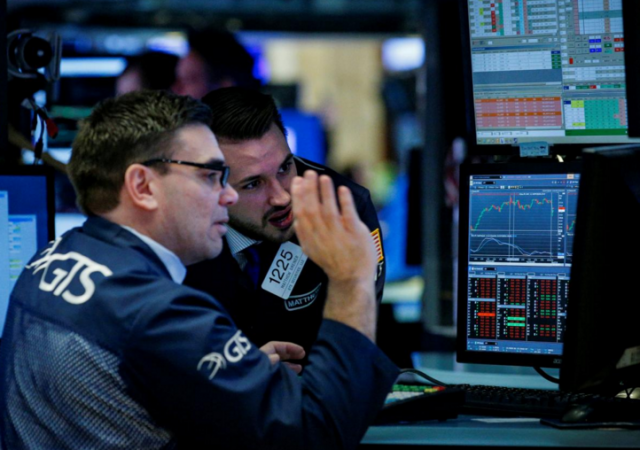
NEW YORK – President Donald Trump’s announcement of import tariffs, and the prospect of retaliation by other countries, is prompting some fund managers to pare their holdings of US stocks and look for opportunities overseas.
The high turnover of key staff in the White House, including the exit of Gary Cohn, the director of the National Economic Council this week is undermining confidence in policy making also.
President Trump said Thursday that he would begin imposing import tariffs of 25 percent on steel and 10 percent on aluminum in 15 days, sparking fears of a global trade war.
Gary Cohn, the chief economic adviser to Trump, who argued against trade protectionism, resigned late Tuesday after
Trump first announced the tariff plan and his successor has yet to be named.
Fund managers from Oppenheimer, Federated, and Wells Fargo are among those that now see international and emerging market equities as more attractive than the US, where the prospect of higher interest rates contributed to a slump in stocks in February, leaving the benchmark S&P 500 stock index up about 2.0 percent for the year-to-date, after turning in a 7.0 percent gain in January.
Overseas stocks, by comparison, are benefiting from synchronized economic growth in both Europe, Asia and the Americas, but offer lower valuations.
The gross domestic product of countries in the eurozone, for example, expanded at a 2.7 percent annual rate in the fourth quarter, outpacing the 2.5 percent gain in the U.S. economy over the same time. The Stoxx 600, an index of companies in the eurozone, trades at a trailing price to earnings ratio of 14.9, compared with a 22.7 P/E ratio for the S&P 500, according to Thomson Reuters data.
“You’re still seeing an earlier stage of an expansion cycle overseas versus the United States, which is likely to bounce between expansion and slowdown in the year ahead,” said Brian Levitt, senior investment strategist at OppenheimerFunds.
Emerging markets such as China and Russia also look attractive given their prospects for economic growth and low equity valuations, he said.
In the US, meanwhile, a Democratic party takeover of at least one branch of Congress in elections in November would bring more stability to Washington by curbing President Trump’s ability to expand protectionist policies, he said.
“History suggests markets do better with divided government because there is less uncertainty with policy because it becomes harder to get anything enacted,” he said.
WHY TARIFFS HURT
The prospect of import tariffs could damage the U.S. economy by raising costs for US. manufacturers and consumers, while prompting its trading partners to impose their own levies on U.S. exporters, increasing their costs also and sapping overseas demand.
Daniel Pinto, a co-president at JPMorgan Chase & Co, said in an interview with Bloomberg on Thursday that the US equities could fall by between 20 and 40 percent over the next three years if a global trade war breaks out.
Brian Jacobsen, multi-asset strategist at Wells Fargo Asset Management, said that the risks of retaliatory tariffs is prompting him to add to emerging markets and international stocks but at a slow pace, despite the fact that they look more attractive on a fundamental basis.
“Strategically, we still really like international and emerging markets, but when you have asymmetric risks, that makes us a little cautious on non-U.S. assets for now”, given that markets have not yet priced in the possibility of more protectionist policies, he said.
Overall, US fund managers have been reducing their stake in domestic stocks as interest rates rise, making bonds more attractive.
US balanced funds, which hold both equities and bonds, now have an average of 55 percent of their assets in stocks, a 4.0 percent decline from 2014, and nearly 41 percent of their assets in bonds, according to Lipper data.
Yet Ashwin Alankar, head of global asset allocation at Janus Henderson Investors, said that he remains a fan of large-capitalization US stocks despite the likelihood of higher trade costs and inflation.
The recently-passed US corporate tax cuts provide on-going fiscal stimulus that should balance out higher interest rates, he said, a boost to stock prices that is not found in other markets.
As a result, he is moving more of his portfolio in large-cap US stocks, he said.
“Europe isn’t talking about fiscal spending, Japan isn’t,” he said. “The US is the only market in the world right now that could have the tailwind of fiscal spending.”









